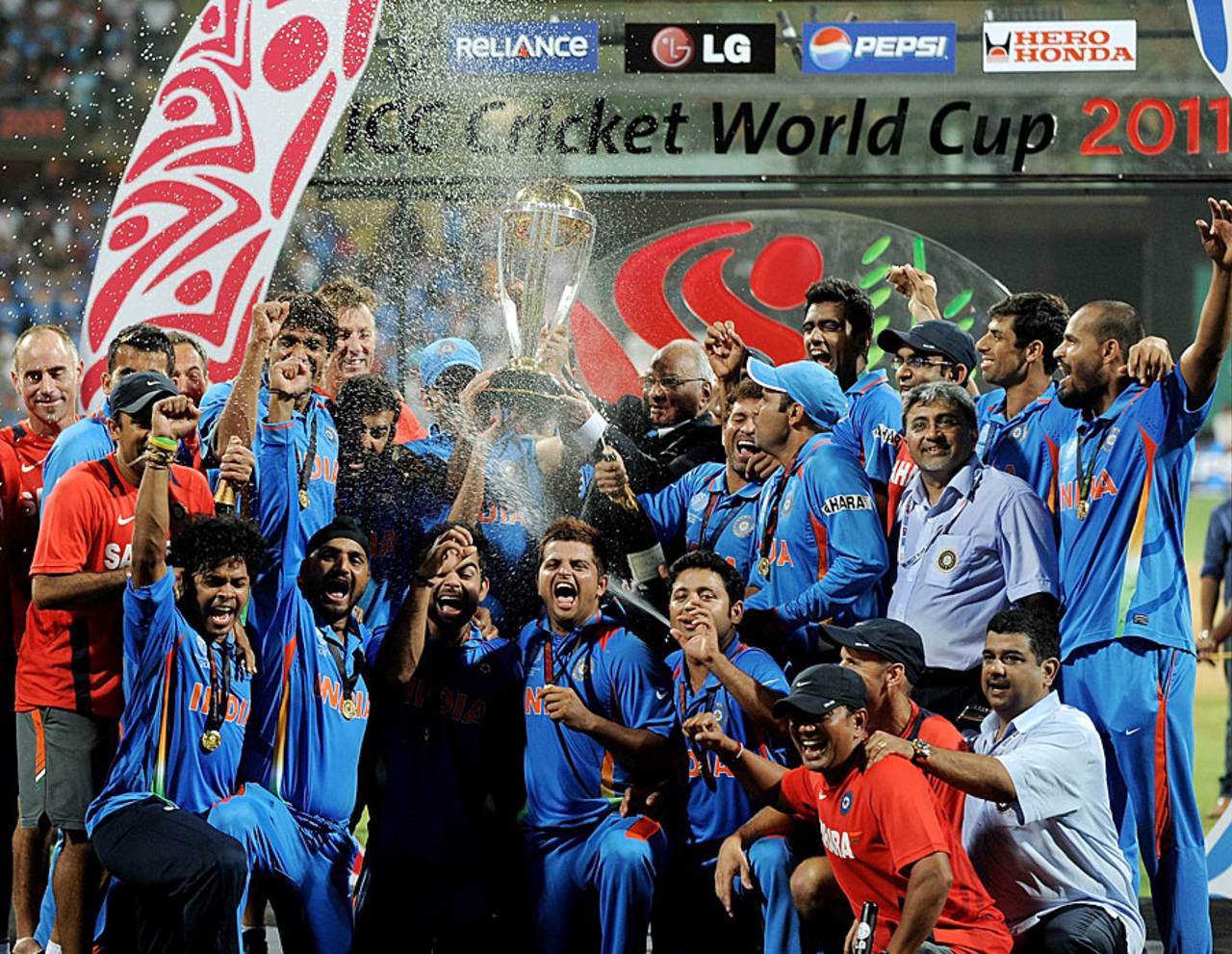India win their second World Cup
MS Dhoni leads from the front to put paid to Sri Lanka's hopes

Co-hosts India took the 2011 World Cup title with a six-wicket win • AFP
Twenty-eight years after they first won the World Cup, India won their second title. Favourites going into the tournament, the tenth, they came up against Sri Lanka, playing their second World Cup final in a row, and broke a number of hoodoos in the Mumbai final: of home teams never having won the title, teams chasing having won only twice before, and century-makers in finals never having finished on the losing side. When Mahela Jayawardene produced a perfectly paced hundred and Lasith Malinga struck early to reduce them to 31 for 2, India looked a long shot, but Gautam Gambhir anchored them with a resolute 97. Then MS Dhoni, the captain, walked out at No. 5 instead of Yuvraj Singh - who was later voted Man of the Tournament - and delivered an innings for the ages, seeing off the threat of Muthiah Muralidaran (who was playing in his last game) and finishing proceedings majestically with a six clouted high over long-on to cue night-long celebrations all over Mumbai and India.
Singapore's inaugural one-day international, and some unforgettable pyrotechnics from Sanath Jayasuriya. At the smallish Padang ground he savaged Pakistan for a century off just 48 balls - a record at the time - and in all, walloped 134 off 65 balls of pure bedlam. There were 11 fours and 11 sixes, including four sixes in a row. Sri Lanka won a match of 664 runs, another record that has since been broken. The next time they met Pakistan, in the final five days later, Jayasuriya belted 76... off 28 balls.
Australia batter Michael Clarke, who was born today, had a sensational debut against India in Bangalore in 2004, scoring 151 to give Australia the series lead in the conquest of their "final frontier". Clarke took over from Ricky Ponting as Australia's captain in all three formats in 2011, and after leading the side to defeats in Cape Town - where Australia were bowled out for 47 - and in Hobart against New Zealand, he presided over a series whitewash against India, scoring his maiden triple-century in the process. In his next seven Tests Clarke scored three double-hundreds, and he ended 2012 with 1595 runs, averaging over 100. The year 2013 started off equally productively in terms of his run-scoring, but Australia lost 0-4 in India and 0-3 in England. No one expected anything different for the home Ashes at the end of the year, but Clarke led Australia's resurgence with a 5-0 mauling of England and a 2-1 defeat of South Africa away. He signed off from ODIs in style in 2015, having led Australia to their fifth World Cup win, but didn't have the same successful ending to his Test career, losing the Ashes that followed in England 3-2.
Birth of an innovator. Dermot Reeve had enough theories and plans to make an MCC member choke on his coaching manual. In one match, against Hampshire in 1996, he deliberately dropped his bat time and time again when facing left-arm spinner Raj Maru, so that he could not be given out caught off the glove. Reeve and Bob Woolmer formed a formidable captain-coach partnership and led Warwickshire to unprecedented success in the mid-1990s. Reeve - who was born in Hong Kong, and played for them in the 1982 ICC Trophy - could certainly play (he famously went after Allan Donald in the 1992 World Cup semi-final, and had about six different slower balls), and was probably unlucky not to lead England in one-day cricket.
One of cricket's finest writers is born, in Manchester. Neville Cardus revolutionised sportswriting by rejecting the accepted way of doing things; Matthew Engel described him as "an artist of devastating originality". A Guardian man who was notably anti-establishment and whose beginnings in life were distinctly humble, Cardus was knighted in 1967 and died in 1975. He was also a distinguished writer on music.
Pakistan seamer Mahmood Hussain, who was born today, gave wholehearted support to the great Fazal Mahmood in Pakistan's formative years as a Test-playing nation, and took five wickets in their memorable victory over England at The Oval in 1954. Mahmood was often overbowled, but one of his injuries was a blessing in disguise: he bowled only five balls before hobbling off in Kingston in 1957-58, when Garry Sobers smacked his famous 365 not out. Mahmood died in Harrow in 1991.
Birth of the gangling New Zealand swing bowler Richard Collinge, who despite 110 Test wickets and a batting average of 14 is best remembered for his feats with the willow. Against Pakistan in Auckland in 1972-73, Collinge made 68 not out, then the highest Test score by a No. 11, and added a record 151 for the tenth wicket with Brian Hastings. But bowling was his trade, and he took six wickets in New Zealand's first victory over England, in Wellington, including, crucially, Geoff Boycott in each innings.
1869 Flooi du Toit (South Africa)
1875 Arnold Warren (England)
1911 Myrtle Maclagan (England)
1956 Farrukh Zaman (Pakistan)
1959 Ken MacLeay (Australia)